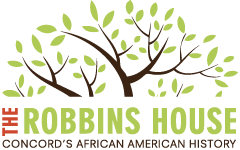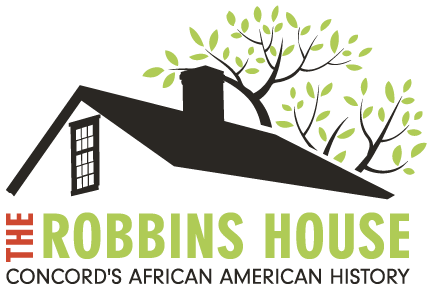We offer a wide range of educational opportunities to serve diverse audiences:

- K-12 Students, Teachers, Administrators
- Adult Learners
- Scouts/Community Groups/Civic Organizations/Media Members
- Kids & Parents, Families
Guided Tours
Please contact the Concord Chamber of Commerce to arrange a guided tour; we thank them for supporting our mission.
(978) 369-3120
Contact us for more information on bringing an antislavery workshop to your organization, community group, or school.
Self-Guided Walking Tours
The Robbins House has established permanent African American and antislavery walking tours in Concord, MA.
WHAT WAS SLAVERY LIKE IN CONCORD?
In the quarter-century before the American Revolution, more than a dozen individuals in Concord at the top of the economic order owned “servants for life,” whose numbers fluctuated over the years. A census of the town taken in 1764 listed 27 “negroes,” some of whom lived in the section later set off to Carlisle. That figure corresponds with estimates from tax and assessment lists of 25-26 “servants for life,” as they were called by officials of the province. Most of these men and women labored as household servants or did chores on the small farms of the town; their work made essential contributions to the households of the ministers, merchants, doctors, lawyers, public officials, and gentleman farmers commanding their service. Unlike coerced laborers on Southern plantations, Concord’s enslaved inhabitants did not produce staple crops for export markets.
In 1790, at the start of the new nation under the Constitution, the non-white population of Concord was 29 on the first federal census. Ten years later African Americans numbered 38 out of 1,679 inhabitants or 2.3% of the whole – the peak figure during the antebellum period.
As late as 1850, with anti-slavery activism at a height, 33 free people of color were inhabitants. Though only 1.5% of the town, local blacks had a larger presence in Concord than in the state overall. They had held their own as free citizens of the Commonwealth.
~ Professor Robert Gross
Author of The Minutemen and their World, Draper Professor
Emeritus of Early American History, University of Connecticut
WHY DID MEN OF COLOR ~ ENSLAVED OR FREE ~ FIGHT IN THE AMERICAN REVOLUTION?
There is some evidence to indicate that enslaved men hoped to gain their freedom by serving in the Revolutionary War. Although the records are not always clear, some enslaved men were able to parlay terms of military service in exchange for their freedom from slavery. Other enslaved men took matters into their own hands and ran away from their owners to serve in the Continental Army in 1775. Soldiers of color returning to Massachusetts at the close of the Revolutionary War in 1783 were thrust into a nebulous position within the state’s social hierarchy. Although legally no longer slaves (due to the 1783 Quock Walker court case and the MA Declaration of Rights), people of color often found themselves with little or nothing to use in support of their livelihoods. Many drew on their military experiences to establish new networks and communities.
~John Hannigan,
Ph.D. candidate in History, Brandeis University, Minute Man
National Park 2014 Scholar in the Park researching Patriots of Color
Related Books
Black Bostonians: Family Life and Community Struggle in the Antebellum North by James Oliver Horton and Lois E. Horton (Holmes & Meier Pub; Revised edition Jan 2000)
Black Reconstruction in America: Toward a History of the Part Which Black Folk Played in the Attempt to Reconstruct Democracy in America, 1860-1880 by W.E.B. Du Bois
Black Walden: Slavery and Its Aftermath in Concord, Massachusetts, by Elise Lemire (University of Pennsylvania Press, 2009)
Disowning Slavery: Gradual Emancipation and “Race” in New England, 1780-1860, by Joanne Pope Melish (Cornell University Press, 2000)
Free Black Communities and the Underground Railroad: The Geography of Resistance by Cheryl Janifer LaRoche (University of Illinois Press; 1st Edition edition, December 12, 2013)
<strong>From Slavery to Freedom: A History of African Americans, 9th Edition by John Hope Franklin and Evelyn Higginbotham (McGraw-Hill; 9th edition, January 15, 2010)
Gateway to Freedom: The Hidden History of the Underground Railroad, by Eric Foner (W. W. Norton & Company, January 19, 2015)
Hard Road to Freedom: The Story of African America, by James Oliver Horton and Lois E. Horton (Rutgers University Press, 2001)
Interpreting African American History and Culture at Museums and Historic Sites by Max van Balgooy
Interpreting Slavery at Museums and Historic Sites by Kristin L. Gallas & James deWolf Perry
Liberty and Freedom: A Visual History of America’s Founding Ideas, by David Hackett (Fischer Oxford University Press November 15, 2004)
Memoir of James Jackson, the Attentive and Obedient Scholar, Who Died in Boston, October 31, 1833, Aged 6 Years and Eleven Months, By His Teacher, Miss Susan Paul, Lois Brown (ed.), (Harvard University Press, 2000)
The Minutemen and Their World, by Robert Gross (Hill and Wang, 1976; 25th anniversary edition 2001)
Mr. and Mrs. Prince: How an Extraordinary Eighteenth-Century Family Moved Out of Slavery and into Legend, by Gretchen Holbrook Gerzina (Harper Paperbacks; Reprint edition 2009)
NPS Patriots of Color, ‘A Peculiar Beauty and Merit’: African Americans and Native Americans at Battle Road & Bunker Hill, by Revolutionary War consultant George Quintal, Jr., (National Park Service, 2002)
Pauline Elizabeth Hopkins: Black Daughter of the Revolution, Lois Brown (University of North Carolina Press, 2008)
The Problem of Slavery in the Age of Emancipation by David Brion Davis
Sarah’s Long Walk: The Free Blacks of Boston and How Their Struggle for Equality Changed America, by Stephen Kendrick (Beacon Press, 2006)
Schooling the Freed People: Teaching, Learning, and the Struggle for Black Freedom, 1861-1876 by Ronald E. Butchart
Slavery and the Making of America, by James Oliver Horton and Lois E. Horton (Oxford University Press, 2006)
“Slavery in Massachusetts,” by Henry David Thoreau in Cape Cod and Miscellanies, Volume 4 of the Manuscript Edition of The Writings of Henry David Thoreau (Boston: Houghton Mifflin, 1906).
The Slave’s Cause: A History of Abolition by Manisha Sinha
Ten Hills Farm: The Forgotten History of the North, by C.S. Manegold (Princeton University Press, 2009)
To Set this World Right: The Anti-slavery Movement in Thoreau’s Concord, by Sandra Harbert Petrulionis (Cornell University Press, 2006)
Understanding and Teaching American Slavery by Bethany Jay & Cynthia Lynn Lyerly
We Are Your Sisters: Black Women in the Nineteenth Century. Edited by Dorothy Sterling. 1913
Interpretative Resources
National Association for Interpretation
Personal Interpretation: Connecting Your Audience to Heritage Resources(Third Edition) by Lisa Brochu & Tim Merriman
Interpreting Our Heritage by Freeman Tilden
The Gifts of Interpretation: Fifteen Guiding Principles for Interpreting Nature and Culture, 3rd Edition by Larry Beck & Ted T. Cable
For young readers and teachers
African American Heritage in Massachusetts: A Coloring Book, written and published by Rosalyn D. Elder, Artists for Humanity, illustrations by Lawrence Pierce
Beyond Freedom by Patricia Q. Wall (Fall Rose Books, 2010)
Child out of Place: A Story of New England by Patricia Q. Wall (Fall Rose Books, 2004) a historical novel set in Portsmouth, NH, and its sequel set in Boston, Mass.
Follow the Drinking Gourd by Jeanette Winter (Alfred A. Knopf, 1988)
Teaching Hard History Key Concept Videos
In these videos, scholars and historians explore the Key Concepts of the Teaching Hard History framework by discussing slavery’s impact on the lives of enslaved people in what is now the United States and the nation’s development around the institution. They also explain how enslaved people influenced the nation, its culture and its history.
The 1619 Project
The 1619 Project is a program organized by The New York Times with the goal of re-examining the legacy of slavery in the United States and timed for the 400th anniversary of the arrival in America of the first enslaved people from West Africa.
Introducing ‘1619,’ a New York Times Audio Series
Hosted by Nikole Hannah-Jones, produced by Annie Brown, Adizah Eghan and Kelly Prime, and edited by Larissa Anderson, Lisa Tobin and Lisa Chow
Four hundred years ago, a ship carrying enslaved Africans arrived in the English colony of Virginia. A new Times podcast examines the long shadow of that fateful moment.
Friday, August 23rd, 2019








